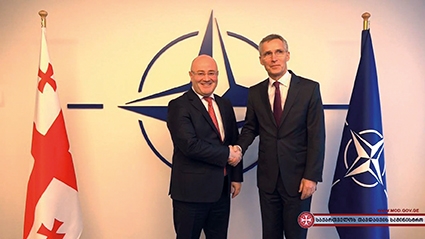NATO & Partner Defense Ministers Gather in Brussels
Defense Minister of Georgia, Levan Izoria, took part in a two-day series of meetings with defense ministers from NATO allies and partners in Brussels, February 13-14. NATO declared that the talks centered on “pressing security challenges, including Russia’s violation of the Intermediate-Range Nuclear Forces Treaty. Ministers will discuss efforts to strengthen the Alliance’s deterrence and defense, and review NATO missions in Afghanistan, Kosovo, Iraq and the maritime area. Burden-sharing and NATO-EU cooperation will also be high on the agenda.”
On Wednesday, Izoria met with NATO Secretary General Jens Stoltenberg and Deputy Secretary General Rose Gottemoeller. The main topics during the meeting included, according to the Ministry of Defense’s Twitter account, Georgia’s unwavering aspiration to NATO membership, increasing public support for NATO in Georgia, and the upcoming NATO-Georgia exercises in March.
This year will be the first NATO-Georgia exercise where Georgia leads the planning and execution process. Secretary General Stoltenberg will visit Georgia during the exercises.
While in Brussels, Izoria also met with US Ambassador to NATO Kay Bailey Hutchison. Izoria called the meeting “very interesting and meaningful,” and noted that they discussed a series of bilateral issues, including “perspectives of Georgian membership in NATO and NATO’s Open Door Policy that was recently implemented in relation to North Macedonia and previously Montenegro,” as well as defense plans for 2019, Georgia’s Defense Readiness Program (GDRP), fair distribution of budget and resources, multinational exercises, and the “Total Defense” concept.
After meeting with Hutchinson, Izoria held brief meetings with the defense ministers of Bulgaria and Romania, thanking the Bulgarian Embassy in Tbilisi for being an “effective contact point” between Georgia and NATO and thanking Romania for its faithful support of Georgia’s territorial integrity and sovereignty. Earlier in the day, Izoria and his staff sat down with the Lithuanian delegation for bilateral consultations. “Lithuania expressed continuous support to Georgia in areas of military training and education, stratcom, cyber security, and implementation of the Substantial NATO-Georgia Package,” said the Georgian Ministry of Defense.
The day before the ministers descended on Brussels, retired US Army Lieutenant General Frederick Benjamin Hodges III was interviewed by Voice of America. Hodges, who served as commanding general of US Army Europe (USAREUR), from 2014 – 2017, recommended that NATO invite Georgia to the Alliance during the next summit.
“Georgia should be an Alliance member because it can improve the situation in terms of security. In addition, Georgia has done everything that it was required to do,” he said. He also emphasized the positive reputation of Georgian soldiers among the Allies – “Everyone wants to fight [alongside] Georgians because they are so good. So, they have nothing to prove. Now, it's the turn of the Alliance to take the next step and invite Georgia to be a NATO member.”
In other news coming out of the NATO meetings in Brussels this week, it was announced that the Embassy of Poland in Tbilisi will replace Bulgaria as the official contact point embassy between NATO and Georgia for the next two-year term.
Poland’s Ambassador to Georgia, Mariusz Maszkiewicz, noted that “Poland has always been a faithful friend of Georgia,” and expressed his hope that the role would allow Poland to help facilitate Georgia’s continued process of NATO integration, while strengthening the relationship between the two countries.
The contact point embassy model was developed in the early 1990s, “to support the Alliance’s partnership and public diplomacy activities” in partner countries, says NATO. The functions of the contact point embassy include serving a public diplomacy role and providing support, as needed, in implementing Alliance activities with partners.
By Samantha Guthrie
Image source: Ministry of Defense of Georgia












